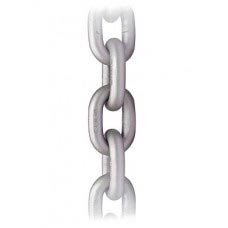 In the spectrum of industrial chains, Grade 100 stands out for its superior strength and durability, being approximately 25% stronger than Grade 80 and far surpassing the lower grades like 30, 40, and 70, which are more suited for non-lifting tasks such as towing and load securing. While Grade 120 offers even greater strength, ideal for the heaviest lifting tasks, Grade 100 remains the preferred choice for a wide range of heavy-duty rigging and lifting applications, striking a balance between high performance and versatility.
In the spectrum of industrial chains, Grade 100 stands out for its superior strength and durability, being approximately 25% stronger than Grade 80 and far surpassing the lower grades like 30, 40, and 70, which are more suited for non-lifting tasks such as towing and load securing. While Grade 120 offers even greater strength, ideal for the heaviest lifting tasks, Grade 100 remains the preferred choice for a wide range of heavy-duty rigging and lifting applications, striking a balance between high performance and versatility.
What are the core characteristics of grade 100 chain alloy?
Material Composition
Grade 100 chains are made from high-quality alloy steel designed for lifting purposes. The alloy typically includes elements like chromium, molybdenum, and manganese, contributing to the chain's overall characteristics. This alloy composition offers a superior balance of strength, ductility, and resistance to wear and fatigue compared to lower-grade materials.
Tensile Strength
The significantly higher tensile strength of Grade 100 chains, typically ranging from 880 to 970 megapascals (MPa), about 20% more than Grade 80 chains, is due to their specialized alloy steel composition and advanced manufacturing processes. Key elements such as chromium, molybdenum, and manganese in the alloy steel enhance the chains' strength and resistance to wear. The rigorous heat treatment process, including quenching and tempering, refines the steel's grain structure, enhancing its strength and ductility. This process increases tensile strength and ensures excellent durability and reliability, making Grade 100 chains particularly suitable for demanding lifting tasks, where the ability to handle heavy loads safely with reduced risk of failure is crucial.
Working Load Limit (WLL)
The Working Load Limit (WLL) of a Grade 100 chain is approximately 25% higher than that of a Grade 80 chain of the same diameter, primarily due to the superior material composition and manufacturing processes of Grade 100 chains. These chains are made from high-quality alloy steel, including chromium, molybdenum, and manganese, enhancing their tensile strength and toughness. Their advanced heat treatment process further augments this strength, allowing the chains to withstand more significant stress and load without compromising safety. Therefore, a 10mm Grade 100 chain can safely handle loads up to 6,300 kilograms, significantly more than the 5,000 kilograms limit of a similarly sized Grade 80 chain. This increased WLL makes Grade 100 chains more versatile and efficient for heavy lifting applications, as they provide greater lifting capacity without the need for a larger or heavier chain, thereby improving handling and reducing overall operational costs.
Besides the three characteristics detailed above, grade 100 alloy differs and stands out in several other ways. These categories include:
- Heat Treatment
- Resistance to Abrasion and Fatigue
- Safety Factor
- Identification and Traceability
- Standard Compliance
- Corrosion Resistance
- Color Coding
- Flexibility and Versatility
- Applications
- Size and Dimensions
It would help if you reached out for more information about grade 100 alloy chains for more help. Getting the proper alloy chain for your specific job and application is essential. Let our team help get you set up the right way.
Related Reading